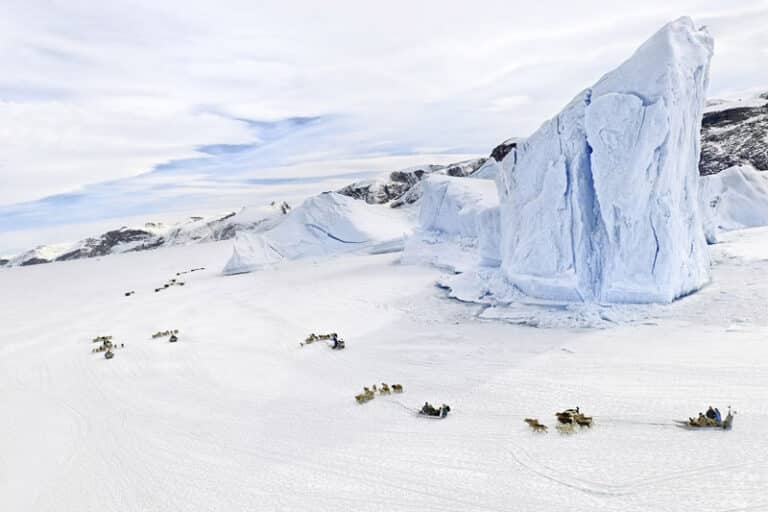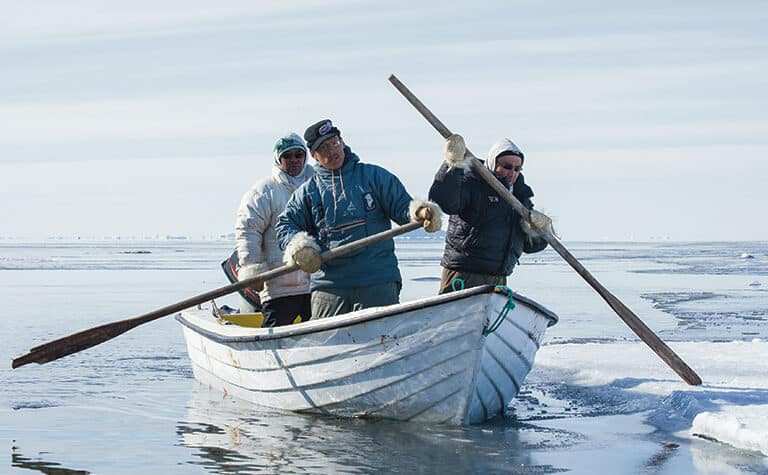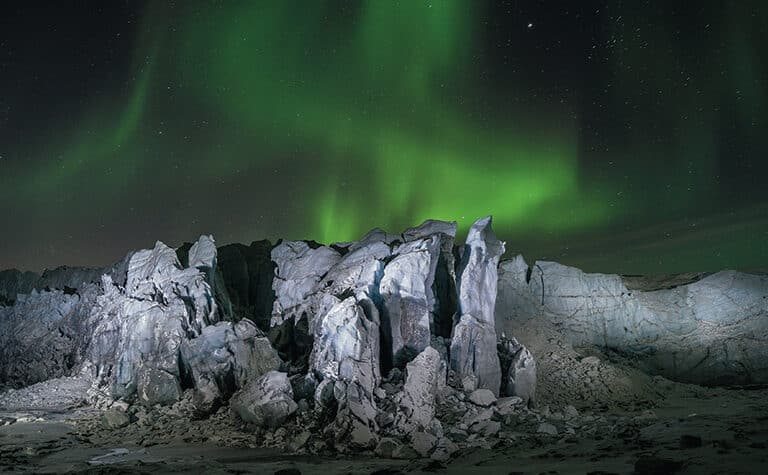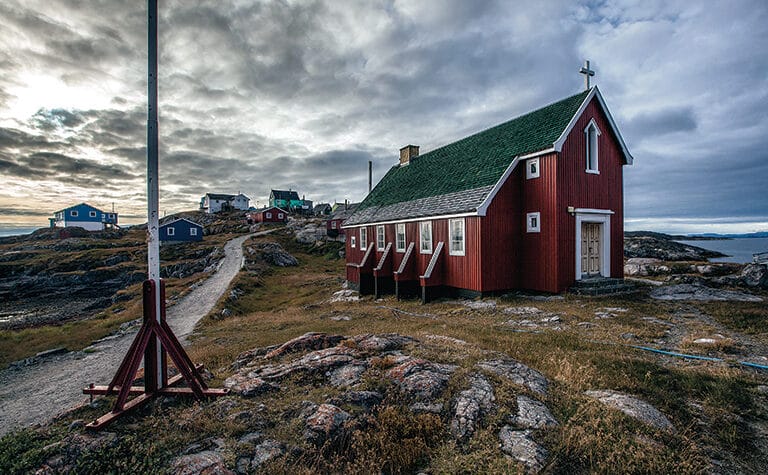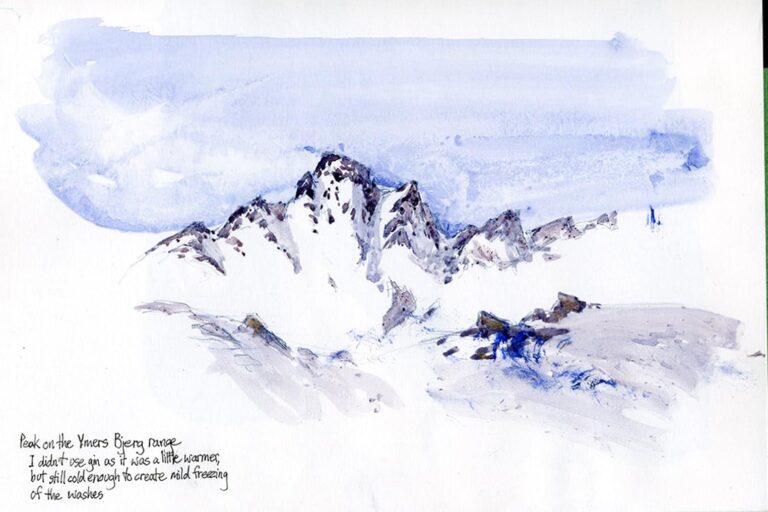
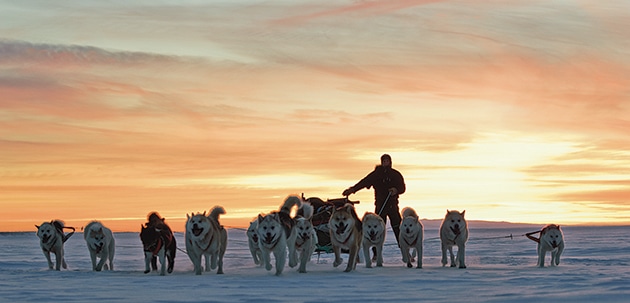
The Sirius Sled Patrol
Jump to chapter
Published: 01/07/2015
Reading time: 14 minutes
Text: Mads Nordlund
Photo: Morten Hilmer
Article from the former magazine, Greenland Today
Morten Hilmer was 25 years old when he started with Sirius in 2005. As a boy, he had spent a couple of holidays in Nuuk, visiting a relative who worked at Hotel Hans Egede. His father had also previously worked in Greenland and his mother always spoke of Greenland with enthusiasm.
So when he was a boy, he played with a toy sled and soldier’s clothes, pretending he was with Sirius on a trip. Since his fourteenth birthday, he had dreamed of being a member of the Sirius Sled Patrol. He read many books about Sirius and hoped to be selected as a member.
– I had a very strong need to test my own boundaries in a situation where I was dependent upon my hands and my head – no safety net, says Morten Hilmer. It is when you are under mental and physical duress that you find out what you are made of.
– I applied to the patrol for the first time after I finished sergeant training. I had a girlfriend and perhaps I was not ready mentally, so I didn’t succeed. Then I got my high school diploma and applied again. This time I was 100 percent focused, I had built up my body, I was a lifeguard and I ran, swam, cycled, and took part in orienteering races – so I was completely ready for the interview in 2004.
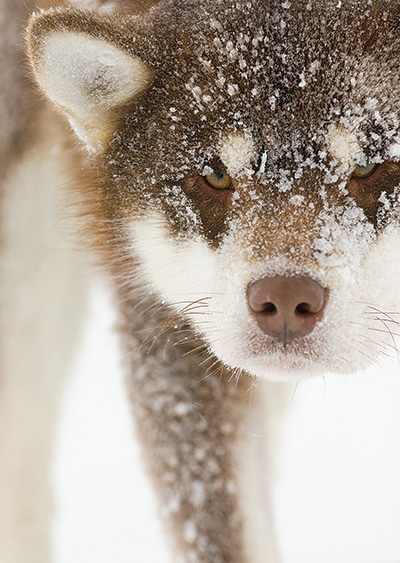
Welcome to Daneborg
– When I landed at Daneborg for the first time, my dream had come true. Here I was, with my eyes on Greenland and I had just been given the Sirius badge to sew onto my clothes.
– I can remember thinking »This is one of the biggest moments of my life« because my dream had come true. It was damned huge and all kinds of thoughts ran through my head, about my family and about being a long way from home with plenty of liberty and adventures to come. It felt absolutely right.
A standard contract is 26 months. After the first year, you get a week’s holiday in Iceland where you get a dental check, etc. The first year, you are the »young« man and in training, the second year you are the »old« man. It is a tried and tested method that makes sure you learn from someone who has been there. This also ensures that no knowledge is lost and that know-how is constantly passed on to the next person. The method also ensures that no one »gets stuck« and that everyone moves on afterward. After the two year period, you can take one more year, either as a substitute or as a leader.
Daneborg is the headquarters for the Sirius Sled Patrol. There is also a summer station on Ella Island, in King Oskar’s Fjord near Mestersvig.
On average, there are 50 suitable candidates each year, but only six are needed. Seven are selected for Sirius Preparatory School which lasts about six months. The final man is weeded out in the process.
– It is not about doing the most push-ups or running faster. It is about finding a dynamic group of people who can work together and who have different skills. The group usually includes many craftsmen, explains Morten Hilmer.
There are six sled teams consisting of two men and twelve dogs on the base. They do a spring trip from January to June and an autumn trip from November to December. The short, four-month summer is very busy. Supply depots are flown or sailed out and the one annual ship arrives with supplies.
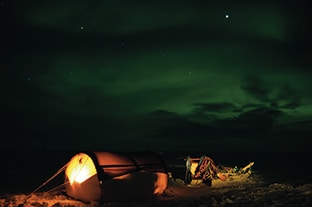
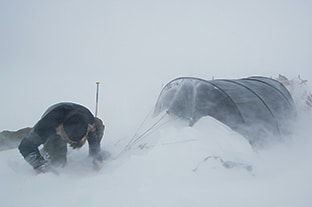
Weather and cold
– You don’t feel cold in the same way in Greenland because of the low humidity. When you arrive, it feels cold, but when you live there, you gradually become accustomed to it. When there were visitors, they wore big jackets, while we wore work shirts, says Morten and smiles at the memory.
– It’s the same with the light. It disappears gradually. The first day the sun doesn’t come up you think »Wow«. I thought it was exciting and looked forward to the dark time and the quiet. The water and the rivers stop running because they freeze. The fjord freezes too, so there are no waves or swells that lap at the shore. The small birds fly south so there is no birdsong. Only the ravens overwinter. And then a thick layer of snow comes that muffles everything even more.
– But you must have respect for the weather. It is not something you mess around with. Regardless of what equipment you have, you will die if you don’t respect the weather. There are violent storms that can last 4-5 days. We were once stuck for four days in bad weather. Although the tent was tied to the sled, it was ruined by the storm and we had to use our reserve tent. In Northeast Greenland, it is potentially fatal to be unprepared and unequipped to deal with the cold. And it doesn’t matter whether you are one kilometer or one thousand kilometers from home.
– I loved the snowstorms, I thought they were marvelous. Once, when I went to see my dogs at Daneborg a gust of wind blew me into the ditch. It was only a meter deep, but I lost my bearings and got turned around. Here, I was in peril just 50 meters from a warm room. I thought I could follow the fence to get back, but I took the wrong direction. If I had not had the fence, I could have got lost right next to our camp.
– It is quite common to get stuck in a place for several days because of a storm. The sled and tent stand up against the wind to form a plume of snow behind the tent so the entrance is kept free and you don’t get snowed in. The alarm clock is set to ring each hour and you have to go out and see the dogs so they don’t get »snowed in«. They lie tied to one long chain and if a dog pees on the chain, it can freeze to the ground and hold them down if there is heavy snowfall. So you have to go out into the storm and pull the chain loose.
– There is also a special phenomenon – the warm Foehn wind. You can drive all day in minus 25 degrees. Suddenly you awake in the middle of the night because it is plus 10 degrees. Outside, the dogs lie on their backs boiling and we dance around in our underwear enjoying it, until the cold returns. It is a surrealistic, but cool experience. Otherwise, it is only »warm« when the sled gets stuck going up a slope and you struggle with the dogs to set it free.
– The lowest temperature I have experienced was minus 51 degrees at Wulfland. We drove at a very calm pace because the cold had made us and the dogs very tired. But we had to head home and we had to travel an average of 30km per day.
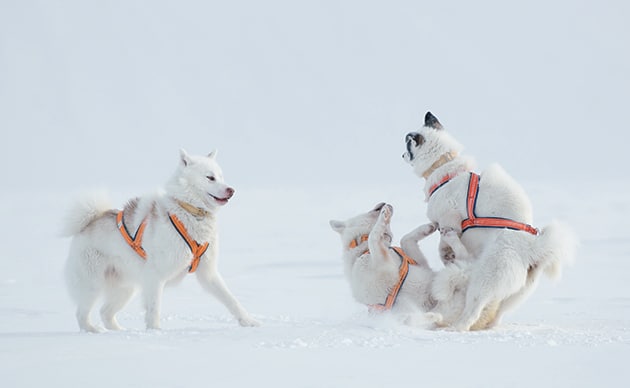
Four-legged friends
The sled dogs are original Greenlandic sled dogs. The genetic variation is extremely wide and to avoid in-breeding, the dogs are acquired in Ittoqqortoormiit, Ilulissat, and Qaanaaq. This means that Sirius has built a very strong strain.
– The dogs mean everything. If Sirius was not based on dogs and sledding, I would not have been there, says Morten.
– I am impressed by how much they can handle frost and low temperatures. If a dog became ill, it rode on the sled until it was OK again.
– You spend a few minutes with each dog every evening. A dog can have a bad day, too, so you have to talk to it for a bit longer and scratch a little more behind its ears.
– It is a question of taking your equipment seriously. The dogs have to be happy and they must have respect for you. The difference between the dogs being afraid of you or liking you is evident if the gangline snaps (the line between the sled and the dogs/Ed). If they are afraid of you, they run home. If they like you, they come back when you whistle.
– A team of dogs is like having 12 extra comrades. If you treat them well, they give you something in return. At feeding time, you lay the food out and they don’t eat until you give the word.
– You think of the dogs as individuals, not as a pack. This is why you can call them separately. The lead dog may well be a bitch and sometimes be in front. But the »boss« – the one in charge – is always a male dog of high caliber.
– There are doghouses at Daneborg and the dogs like to lie on top of them. They only go in when it rains. They love to lie in the snow. They probably use the houses so little, because a sled dog is robbed of its senses inside a doghouse.
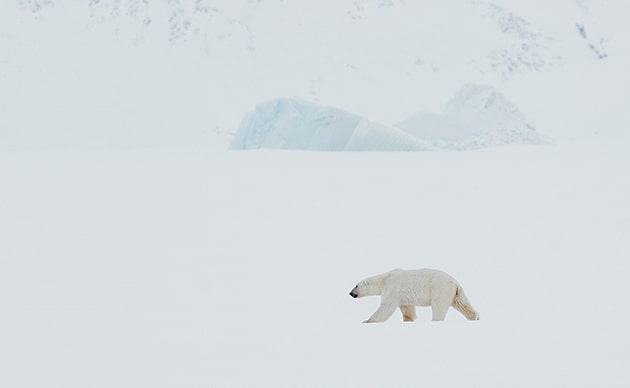
Many memories
– I have many memories from my time with Sirius and it is difficult to single out any particular episode after months of beautiful nature experiences. There were also many amusing things, like hearing one of your mates swearing outside the tent in a storm after the toilet paper had blown away.
There were also several dangerous situations with the wild animals in the national park, says Morten.
– Once, we were at a cabin where a polar bear came right up to the dogs.
– We discharged a flare gun to scare it off, but it came after us instead. We couldn’t close the door to the cabin because of the snow and in the end, we had to shoot the bear. It was only 80cm away from us when it fell.
– Another time, we arrived at the depot late in the day. I was wearing a forehead light and ran ahead with the dogs. They stopped and looked to the right, growling. There stood a musk-ox bull. I was wearing skis and couldn’t really get away. I became entangled in the traces (the dogs’ leads / Ed.)when the bull attacked the dogs and I was in the middle of it all. I lay on my back and took aim with my pistol. And although I shot and hit the bull five times, it didn’t die. It wasn’t until I got my skis off and stood up that I was able to kill it with a shot to the heart.
– It was a close call, says Morten thoughtfully. But not the worst. He believes that all the Sirius folk know what he is talking about.
– The worst thing is the last day. You look forward to going home and seeing your family. But the last goodbye to the dogs is terrible. You go round and pat them and it hits you, that it is over and you will never see them again.
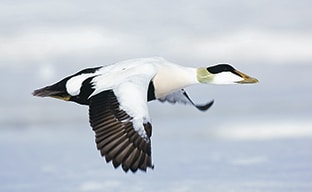
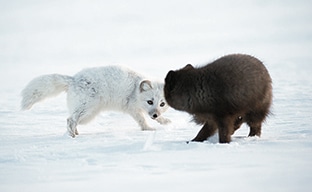
The things close to you
– Today, many people want to test their limits – run marathons, etc. Testing their tenacity and pride. I am very thankful that I have experienced situations where it wasn’t these two things, but my survival that was on the line.
It was not a question of a running time in a race, but of a long, tough haul where you are 100% dependent on what you have learned and on yourself as a person. It is very validating to have succeeded and to know you did the right thing in each situation, says Morten.
– It also requires mental strength to be part of Sirius. Not least when two men drive for months alone in the wilderness. In the beginning, you talk a lot. After a while, you have talked everything through and you start to think a lot.
– After many days in a white-out where you are cut off from everything and there is no new input, you get to the bottom of your thoughts. After hours in a cold, white landscape of snow and ice, you go into a trance-like state. The sound of the dogs’ paws, the sled, and the skis promote a kind of meditation and you attain another level of consciousness and can easily spend 45 minutes without a thought.
– It was also wonderful to discover that the things you miss, the things that are really important, are not your cell phone, computer, or any of the other stuff you have accumulated.
– What you really miss are the relationships you have with your friends and family and your experiences together with them. This is why it is a high priority for me not to be too busy when I am home. You must remember to appreciate the things that are close to you.
– Generally, you could say that we were two men living in a small portable studio apartment with dogs in front. It wasn’t a big auto-camper with a TV and all the equipment people need nowadays to feel comfortable camping. But we had Northern lights. Who else has that? smiles Morten.
– It is all about traveling safely, securing food for yourself and the dogs, and staying cheerful. We were not at the top of the hierarchy of needs; we were occupied with the basics.
– There is a huge difference between shooting a chunk of iceberg to melt into water without salt and an adult man lying in line outside an Apple Store to get the newest iPhone.
– I was just as happy when I traveled around North Greenland without much of anything, as I am now surrounded by all kinds of technical stuff.
– We had a tent, a sleeping bag, food for men and dogs, cooking equipment, eating utensils, a radio, an iridium telephone, GPS, a first aid kit, a rifle and pistol, a flare gun, toiletries, a journal, a camera, a book to read, which you swapped with your partner or in a depot on the way, tools, dog harnesses, sewing equipment, and other necessities. The limitation lies in what fits on the sled. The more you take, the higher the likelihood of tipping over or breaking through the ice, and the harder it is to travel up slopes.
– After a few months with Sirius I had lost 12 kilos. We had driven out from Wulfland to Station Nord for six weeks. Although we maintain good hygiene on the way, you do not bathe during the weeks when you are traveling. We didn’t think we smelled bad after the trip, but the others said were couldn’t come in, until we had bathed. I remember that I wondered why the water in the bottom of the shower was brown until I realized that it was dirt, sweat, dog shit, etc. from me.
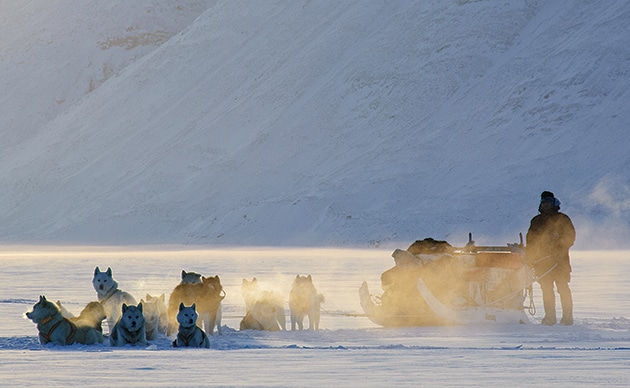
Life after Sirius
– I am passionate about Greenland and I can travel on my own because I have learned how to survive in the wilderness. I work a lot with nature and I have also traveled in Finland, Norway, etc., says Morten, who is self-employed with his own business.
– I make my living photographing, exhibiting, and selling pictures and videos. I have also written a children’s book– the first in a series about wild animals.
– I arrange courses, trips, and talks. The courses are photo courses and the talks are about my adventures with a camera and about having the courage to believe in the dreams you have for your own life – and to follow them. The talks are given at anything from second-chance schools and educational associations to large corporations and sports clubs, explains Morten.
– I am probably best with things like motivation and making an effort. I have a great respect for people, regardless of what they do, but I am not very good at sloppiness – or if people don’t make the effort.
– I believe everyone should follow their dreams. You shouldn’t sit back with a feeling that you should have tried. You have to believe in it and give it a shot. This applies to everything in life.
– Physique and will are important factors, but the most important thing is being able to cooperate. This is a feature that is common to all special units. And you must be able to motivate yourself, so you can carry out a strenuous task.
– Regardless of how long the road is, you start by putting one foot in front of the other. If you believe in this and keep going all the way, you will end up reaching your goal. This applies, however far from your goal you are at the outset, ends Morten Hilmer.
Read more articles from Guide to Greenland
-

Dogsledding – 4 hours | Uummannaq | North Greenland
Tour startsUummannaqDuration4 hoursFrom 2 100 DKKSee more -
Including flights to Greenland!
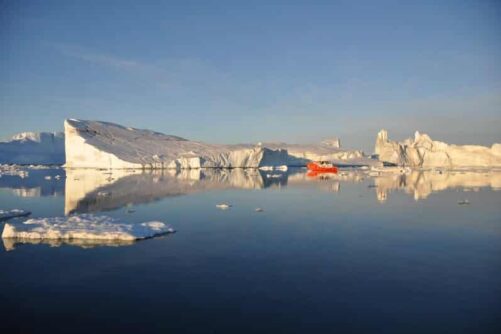
Highlights of Iceland & Ilulissat, West Greenland | 8 Days
Tour startsFrom IcelandDuration8 daysFrom 45 400 DKKSee more -
4.80(15)

Closed boat Fjord Adventure | Nuuk
Tour startsNuukDuration2 hoursFrom 1 050 DKKSee more -

Ice fishing | Uummannaq | North Greenland
Tour startsUummannaqDuration5 hoursFrom 1 000 DKKSee more -
5.00(4)

Quassussuaq Mountain Hike | Nuuk
Tour startsNuukDuration5 hoursFrom 1 975 DKKSee more -
2 departures!

Spring Tour of West Greenland | 8 days | Visiting Ilulissat, Nuuk & Sisimiut
Tour startsFrom CopenhagenDuration8 daysFrom 31 200 DKKSee more -
5.00(1)New Tour!

1-Day Boat Trip to Disko island & Kuannit Hike | Qeqertarsuaq
Tour startsIlulissatDuration9.5 hoursFrom 2 950 DKKSee more -

5-Days Above The Arctic Circle | Sisimiut | West Greenland
Tour startsSisimiutDuration5 daysFrom 9 461 DKKSee more -
5.00(1)1 To 6 Passengers Included

Private Catch’n’Eat | Qooqqut Nuan | Nuuk
Tour startsNuukDuration6 hoursFrom 14 500 DKKSee more -
Accommodation and tours included!
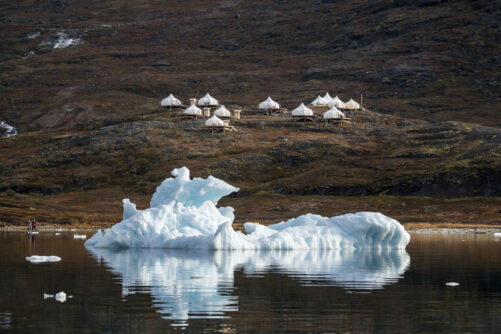
Arctic Capital to Wilderness Escape | 4 Days in Nuuk & 2 Nights in Nuuk Icefjord Camp
Tour startsNuukDuration6 daysFrom 15 400 DKKSee more -
4.91(32)

Nuuk Icefjord | Nuuk
Tour startsNuukDuration6 hoursFrom 2 495 DKKSee more

